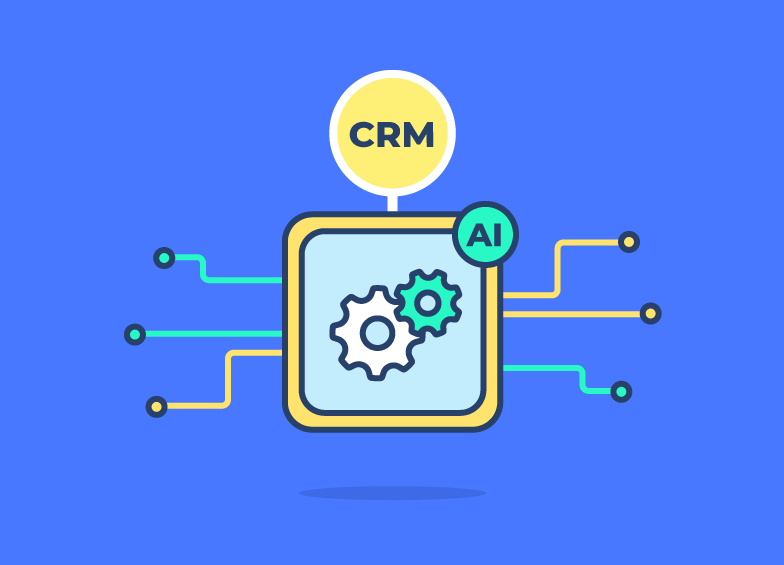How can AI make marketing automation smarter?


Category: AI for CRM
The rise of digitalization since the 2000s has had a strong impact on the marketing professions: the development of e-commerce, the appearance of new activation channels, etc. have increased the number of interactions between brands and their customers and have changed purchasing behavior. The new consumer has become more and more demanding. First of all, the relationship with time has changed scale and real time has become the unit of reference, and above all, they expect to be recognized as individuals. Gone are the days when relationships were driven solely by the brand, they want to be part of a win/win relationship. It is therefore difficult for marketers to respond manually to this (r)evolution: marketing automation has become the solution.
In this article, we will review the benefits of automation and its use by CRM teams and see how AI can help you go even further in facilitating customer marketing management.
The development of digital has generated new behaviors and new expectations from customers. As a result, new opportunities to create a bond have appeared for brands.
Browsing e-commerce sites has provided brands with a wealth of information about their customers: their purchases or purchase intentions, the products they have consulted... In short, a goldmine to be exploited. But to resonate with Internet users, the brand had to be able to react quickly. For example, a customer who has placed a product in the shopping cart is bound to be very interested in it, even if they don't go through with it. What better opportunity to try and get them to reconsider their decision on the spot? But to respond in real time and with personalized content to a customer action or behavior, it's obviously impossible for these marketing actions to be managed by a human. It was therefore essential to entrust management to a tool, so that the brand could exploit the full potential of information transmitted by customers or prospects: cart abandonment, thank-you for a purchase, triggering points in a loyalty program... Automated marketing was born!
It's true that in the early days, marketing automation was essentially a trigger (an email sent following a predefined customer action). Today, however, its scope of application is much broader, particularly in terms of activation channels. It enables finer-tuned, more personalized communication, and therefore higher conversion rates than conventional campaigns aimed at a larger number of contacts.
On the other hand, even if marketing automation has increased the productivity of marketing teams, some of the tasks are still largely manual: the decision to send such and such a message to such and such target must be anticipated and scheduled. All marketing operations are triggered on the basis of predefined conditions (scenarios). So today the question is whether it is still possible for a CRM Manager to imagine all the possible communication opportunities for each of his customers.
The marketing automation has recently shown its limits for a large majority of brands: more and more channels to manage, more and more data to input... Marketing teams have a growing number of new tools at their disposal, which multiplies the number of time-consuming tasks: targeting, message creation, management of different activation channels... Lack of time and the complexity of technologies force marketers to prioritize operations to the detriment of strategy.
So how do you free up time for CRM managers when everything is becoming more and more complicated to manage? How to increase their ability to to make the right decisions and make their CRM a real performance lever? Most brands are making the same observation: there is no point in continuing to pile up tools and increasing the operational load of teams to try to be visible in an increasingly competitive market. The solution lies in innovation and it is the advent of artificial intelligence that has paved the way for a new era of marketing automation.
AI will play an increasingly important role in the implementation of brand strategy thanks to its ultra-powerful computing capacity. Firstly, it will enable the full potential of data, regardless of the source, to be used for behavioral and predictive analysis. But above all, thanks to algorithms and Machine Learning, where a human is able to make predictions at a given moment on a limited and fixed set of data, it offers the possibility to update indicators and scores in an automated way on a daily basis. No more need for human intervention to maintain data analysis models!
The automation of the decision reinforces the benefits of marketing automation to deploy a more efficient marketing strategy.
You have a huge amount of data, but you only use a small fraction of it. With AI, you can finally use it to its full potential.
Data quickly becomes obsolete if it is not updated regularly. With AI, you benefit from data that is updated daily. Decisions are therefore relevant at the time they are made and are no longer based on trends that can quickly become outdated.
Operational tasks are multiplying and becoming more and more time consuming? What you do in an hour, AI can do in a second. You gain in productivity and you free up time to focus on more strategic missions.
No need to create and maintain indicators and scores manually. The computing power allows AI to recalculate and update them daily.
WithAI, operational scalability is within your reach. It enables you to automatically process and exploit huge volumes of data to make the right decisions to trigger and personalize your campaigns according to customer profiles. More relevant, your operations are more efficient, you improve customer relations and ultimately your sales.
Automation is a technology used by almost all brands. It is a mainstay in CRM management and will remain so in 2023. But by coupling it with AI, automation will be the winning combo to maintain or even increase the growth of your CRM.